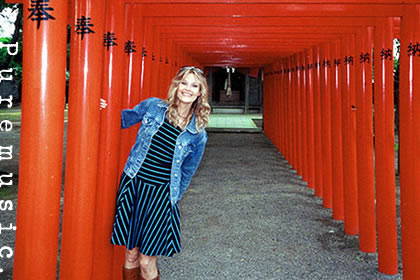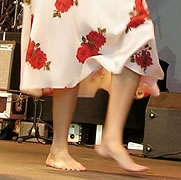
A Conversation
with Elizabeth Cook (continued)
PM: So are there things you'd like to do with your life that you've not attempted?
EC: Well, I think I'd like to maybe have a baby one day, not to say that I haven't attempted it. [laughs] But yeah, I mean, the list is endless. It's endless, all kinds of things.
PM: Again, you'd be surprised how few people say that when I ask.
EC: Really? [laughs] Do they have really specific things already prepared to say, like "I would like to climb Mount Everest"?
PM: Yeah, some people do. And some people just kind of rehash the goals of moment.
EC: I mean, I could look around here right now and think of like, "Wow, I'd really like to go to the Sounds game," or, "Wow, I'd really like to go have a beer at Bobby's." I mean, I can always think of a million things I'd like to do, [laughs] so I will never be at a loss. Life will always be exciting with that attitude.
PM: Yeah, because that would be my answer. It's like, "Things I'd like to do? How about everything?"
EC: Right. I know. I mean, I'm very easily entertained.
PM: Along similar, but musical lines, is there a kind of song or a kind of music you'd like to write or try that you've not attempted yet?
EC: I can't predict that.
PM: Anything in particular you see coming up ahead?
EC: My video, I can't wait to see it.
PM: You did a video?
EC: I did, this week. Got back from New Mexico two days ago.
PM: Wow. Which song?
EC: "Before I Go That Far." Flew to New Mexico and filmed a video for two days with Stacy Dean Campbell. There were five people in an RV, that was it, and shooting for two days. It was so fun! So I'm dying to see how that's going to come out.
PM: That's a fantastic song. I can't wait to see that video.
EC: Thank you. I love it, too. Now, those are two guys that I like to write with that came from the co-writing mill.
PM: Who?
EC: Jim McBride--smokes cigarettes, talks about all his divorces, just an old Alabama boy. He wrote Alan Jackson's "Someday," and "Chattahoochee." Then Jerry Salley, who's just hard driving, kind of comes more from a bluegrass world. And the three of us, well, I love writing with those guys.
PM: Are there songwriters or artists working today that have a big influence on you?
EC: Well, I don't know about influence, because I don't decide that I'm going to do something creatively like it's this other thing, I just sort of do it, and maybe things that I've been listening to fall into that, maybe they don't. But I bought the White Stripes album yesterday. And I've been listening to Neil Young's Zuma a lot. My CD player is screwed up in my car at the moment. It's made me so mad. I had The Best of Dolly Parton--I love the stuff that Porter produced on Dolly, and I love the stuff that Billy Sherrill produced on Tanya Tucker.
PM: How specific. That's wonderful.
EC: Well, it's really different, if you really dig into it. There's a certain layering of the musicality there and the whole--it just works.
PM: That's very interesting.
EC: If you know that and can ever A/B a recording of them under those producers, and then under anywhere else, anywhere in the timeline, it is noteworthy, to my ears.
PM: Is Tim really into traditional country and some of the vintage singers that you may be?
EC: Extremely. Extremely. I think he started getting into that when he was in a punk band in Indiana, and then he started getting introduced to that by the guys he was playing punk music with, and it was George Jones and Hank Williams, primarily.
PM: That cross-pollination between punk and country is always very interesting.
EC: I know it. Isn't it? Isn't that wild...
PM: Yeah.
EC: Then when Tim was up in Manhattan--he talks about just listening over and over again, and then finding Ernest Tubb. And like when he had a band, the Blue Chieftans, covering "Thanks A Lot"--
PM: [laughs]
EC: I mean, what a great wealth of material to choose from and pull great songs out of, songs that wouldn't be the expected covers, that would be great crowd-pleasing bar songs to play.
PM: Robbie Fulks and I were talking about punk and country yesterday.
EC: Yeah, I love Robbie.
PM: He's got very strong ideas about how punk and country really don't go together, they just kind of happen together, and some interesting things happen, but they really don't go very well together.
[laughter]
EC: I think the connection between them isn't in a similarity in where the kick drum is in the mix or where the phrasing is, it's in the approach to how you're communicating. With real country singers, it's always been straight to your gut, and they'll just say something that will cut right to you. "It's been a good year for the roses, and there's the baby down the hall, crying." With punk music, it's the same sort of directness. It's not a lot about the moon and the stars and the silvery clouds and stuff, [laughs] the rainbows over the river. The in-your-face part is where the similarities come from, in my opinion.
PM: You knowhow traditional country has come to be called alternative country--do you feel at all part of alternative country, or Americana, or any of that?
EC: I don't know. I really don't know what to think about all the labels and stuff. I have always felt I didn't belong, all my life, really.
PM: Never did, and I still don't.
EC: Right. I was the only girl on the cheerleading squad from the white trash side of town. It's always been that way. And now I have a really country album that's coming out sort of in the alternative world. Why is that? I don't know. All part of my random life.
[laughter]
EC: I wouldn't have it any other way.
![]()
 |
print (pdf) |
| listen to clips | |
| elizabeth-cook.com | |
| buy the new CD here | |
| bobhaileyphotography.com | |
| puremusic home |